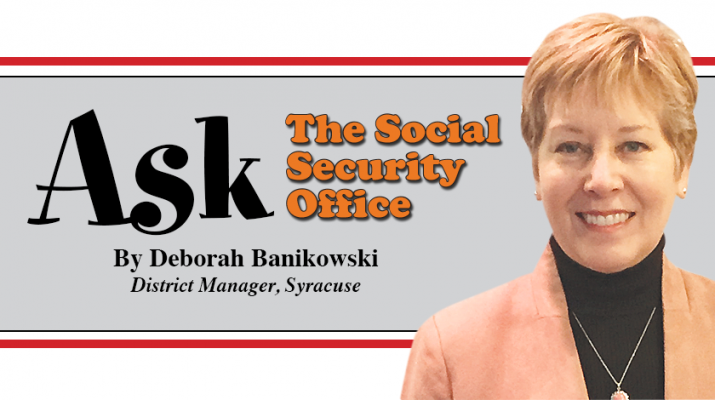By Deborah Banikowski
You made the choice and now you are happily retired after a long process of retirement planning. You filed online for your Social Security benefits. They arrive each month in the correct amount exactly as expected. But did you ever wonder if your Social Security check could increase?
Once you begin receiving benefits, there are three common ways benefit checks can increase: a cost of living adjustment (COLA); additional work; or an adjustment at full retirement age if you received reduced benefits and exceeded the earnings limit.
The COLA is the most commonly known increase for Social Security payments. We annually announce a COLA, and there’s usually an increase in the Social Security and Supplemental Security Income (SSI) benefit amount people receive each month. By law, federal benefit rates increase when the cost of living rises, as measured by the Department of Labor’s Consumer Price Index (CPI-W). More than 66 million Americans saw a 2 percent increase in their Social Security and SSI benefits in 2018. For more information on the 2018 COLA, visit www.socialsecurity.gov/cola.
Social Security uses your highest 35 years of earnings to figure your benefit amount when you sign up for benefits. If you work after you begin receiving benefits, your additional earnings may increase your payment. If you had fewer than 35 years of earnings when we figured your benefit, you will replace a zero earnings year with new earnings. If you had 35 years or more, we will check to see if your new year of earnings is higher than the lowest of the 35 years (after considering indexing). We check additional earnings each year you work while receiving Social Security. If an increase is due, we send a notice and pay a one-time check for the increase and your continuing payment will be higher.
Maybe you chose to receive reduced Social Security retirement benefits while continuing to work. You made the choice to take benefits early, but at a reduced rate. If you exceeded the allowable earnings limit and had some of your benefits withheld, we will adjust your benefit once you reach full retirement age. We will refigure your payment to credit you for any months you did not receive payments. Your monthly benefit will increase based on the crediting months you receive. You can find additional information about working and your benefit at www.socialsecurity.gov/pubs/EN-05-10077.pdf.
Q&A
Q: What is the maximum Social Security retirement benefit?
A: The maximum benefit depends on the age you retire. For example, if you retire at full retirement age in 2018, your maximum monthly benefit would be $2,788. However, if you retire at age 62 in 2018, your maximum monthly benefit would be only $2,158. If you retire at age 70 in 2018, your maximum monthly benefit would be $3,698. To get a better idea of what your benefit might be, visit our online Retirement Estimator at www.socialsecurity.gov/retire/estimator.html.
Q: If I receive Supplemental Security Income (SSI) disability benefits, what is the effect on my benefits if I work?
A: In most cases, your return to work would reduce your benefit amount. Unlike Social Security disability, there is no “trial work period” for people who get SSI disability benefits. If your only income besides SSI is from your work, you can earn up to $1,585 in a month (in 2018) before we stop your payments. Reporting wages each month helps us pay the correct amount of SSI. Timely reporting may also prevent you from owing us money or may allow us to pay a higher amount. We have several publications about SSI, including Reporting Your Wages When You Receive Supplemental Security Income, available at www.socialsecurity.gov/pubs. Note that there are other work incentives that can help you return to work when you receive SSI. You can read about them in What You Need To Know When You Get Supplemental Security Income (SSI), also available at www.socialsecurity.gov/pubs. For more information, visit our website at www.socialsecurity.gov.
Q: I prefer reading by audio book. Does Social Security have audio publications?
A: Yes, we do. You can find them at www.socialsecurity.gov/pubs. Some of the publications available include What You Can Do Online, How Social Security Can Help You When a Family Member Dies, Apply Online for Social Security Benefits, and Your Social Security Card and Number. You can listen now at www.socialsecurity.gov/pubs.

